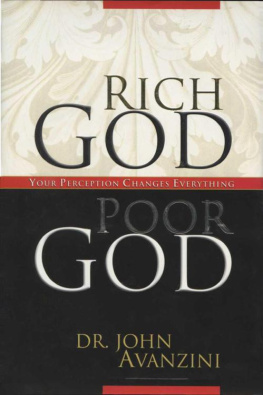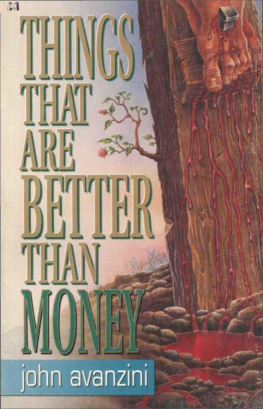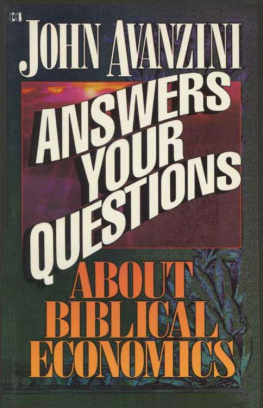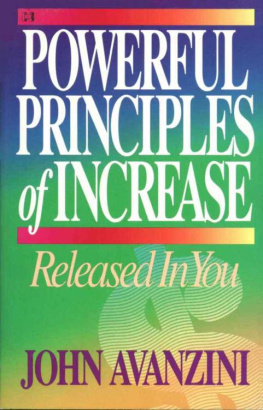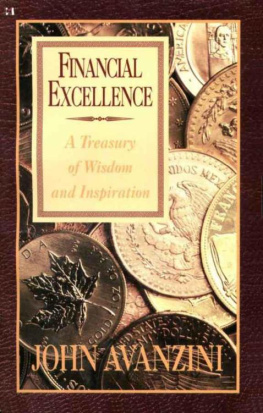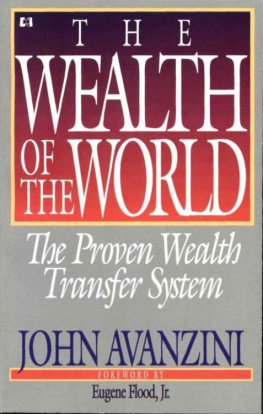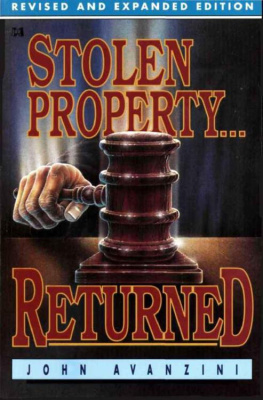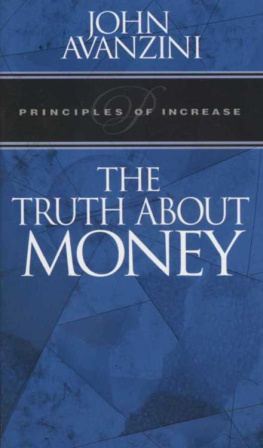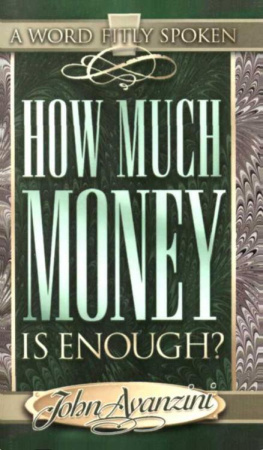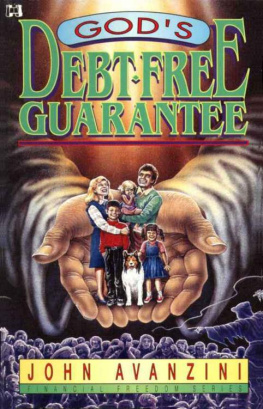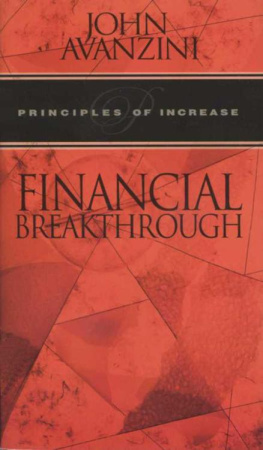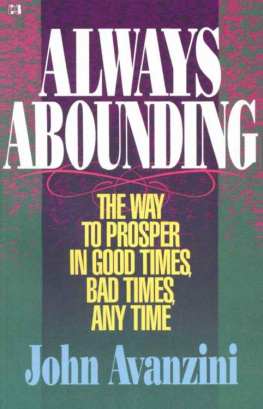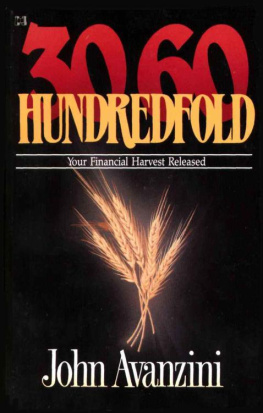Contents
Dedication
Dedicated to Cesar and Sherry Brooks, pastors of First Family Church of Augusta, Georgia, who encouraged me to write this book.
Introduction
RICH GOD OR POOR GOD-WHOM DO YOU SERVE?
I magine a wealthy father whose abundant riches are so great that no one can even begin to guess his net worth. Everyone believes this father to be kind, generous and loving. In fact, even perfect strangers testify to this father's desire to provide the good life for those who serve him.
However, a paradox exists, for many of the children of this most wealthy father sincerely believe he expects them to live meagerly instead of abundantly. They feel they must dwell in mortgaged homes with debt weighing heavily upon their shoulders, hopelessly enslaved to lack and continual need. W hil e faithfully praising the goodness of their father, they never seem to break out of the paralyzing grip of insufficiency. All of this takes place while their rich father's wealth continues to compound, and they fall further and further behind, accumulating bill upon bill, credit card upon credit card, and debt upon debt.
To make matters worse, whenever a special opportunity for the advancement of the father's aggressive expansion program arises, his children must all generously chip in to pay for the new program. They continually encourage one another to scrimp and scrape to fund these special advancement projects for their rich father. These children sincerely believe that it's up to them to provide for their father's dream of world evangelism.
Would you call this father loving, kind or generous? I think not. In fact, when a father in today's culture fails to provide for his children, he is called abusive and uncaring. The courts often force such rogue fathers to pay child support, attaching their wages to assure that their children's needs are properly met. In plain words, the court of public opinion would brand this father's actions as blatant child abuse.
How strange it must seem to the lost people of this world that the notoriously rich God of heaven would so poorly provide for His own children!
Now here is the truth of the matter:
As children of God, we have a heavenly Father who "owns the cattle on a thousand hills" (Psalm 50:10). The rich God of the Scripture openly declares, "The silver is mine, and the gold is mine, saith the LORD of hosts" (Haggai 2:8). Everyone knows the real God has limitless assets. However, much too often His children declare to the world by their diminished lifestyles that He should be classified as a poor god! They are constantly using every possible means to raise funds for their various projects, while they go without the things they need in their personal lives. The thinking folks of this world ask, and rightly so, "How is it possible that a truly rich Father would have so many poor children?"
I ask you again, how can this be when Abraham, the earthly father of the Judeo-Christian faith, calls the God of heaven Jehovah Jireh , the one who abundantly provides for His children (Genesis 22:14)? Contrary to this truth, these poverty-minded saints should rename their god Jehovah Needy, the god whose children provide for him. With this in mind, please allow me to ask you the following questions:
Are you presenting to the world that your God is rich or poor?
Is your Heavenly Father Jehovah Jireh (the God who provides) or Jehovah Needy (the god whose children provide for him)?
YOU WILL HAVE THE GOD YOU PERCEIVE
In this book, you will discover that the Bible teaches you will have the God you perceive, just like the mistaken steward in the Parable of the Talents (Matthew 25:24-26). This wicked steward believed his god to be harsh, cruel, unfair and stingy. Please notice that without as much as a word of opposition to the steward's wrong conclusion, his master allowed him to continue in his error. This mistaken servant had to live with the selfserving god that his flawed theology had given to him.
The actual truth of this parable is that the master was rich not poor, generous not stingy, fair not unfair. Sadly, the misinformed steward never learned his master's true nature. This mistake caused the steward's perception of his master to become his reality.
In Matthew 25:24-26 the mistaken servant perceived God as a taker. Carefully listen to his words as he describes his master.
Thou art a hard man, reaping where thou hast not sown....
Matthew 25:24
This is not an accurate reflection of God's true nature, for God Jehovah never reaps where He doesn't sow. Instead, the exact opposite is true. God is faithful to give generous harvests where His children have sown.
In spite of the tremendous weight of scriptural proof that shows God's unparalleled generosity, many Christians insist on projecting to the world that their God is barely able to provide the resources they need. Listen to the Word of God as it openly declares God's inward desire for the well being and prosperity of His children.
... his divine power hath given unto us all things that pertain unto life and Godliness, through the knowledge of him....
2 Peter 1:3
Let them shout for joy, and be glad, that favour my righteous cause: yea, let them say continually, Let the LORD be magnified, which hath pleasure in the prosperity of his servant.
Psalm 35:27
Through His goodness to His children, the rich God of heaven reveals to the lost world that He loves them and wants to bring them into the good life.
Which God Do You Serve?
Take a brief moment to give yourself this test. Answer yes or no to each question.
What Do You Believe?
Do you believe:
1. While the streets of heaven are paved with gold, your
Heavenly Father would not want you to have much gold or silver w hil e here on earth?
2. While the house of God is decked out in splendor , your home should be only a humble hut?
3. Life is simply a journey to get to heaven, and none of heaven's beauty and riches are available to you along the way?
4. While you are on the journey to heaven, you must sacrifice the truly good things of this life every step of the way?
5. You must watch your pennies, constantly limiting yourself so that you will have enough excess money to do your part in supporting God's plan for world evangelism?
. Each time you hear an evangelistic appeal, you want to give, but you just never seem to have enough money to do it the way you really desire?
If you answered yes to most of these questions, you are projecting to the world that your god is poor!
BECOMING THE CHILD OF THE RICH GOD
If you would like to start projecting to this lost and dying world that your God is a good Godone who loves them and is willing to generously provide for themjust keep on reading. This book will show you how to:
Be set free from the bondage of traditional religion's poor-god syndrome.
Be delivered from the ongoing burden of having to continually bail out a needy god.
Be enlightened to God's plan for you to have abundant blessings in this life as well as in the next life.
Be released from the deceptions of organized religion.
Become re-acclimated to living in the abundant environment of Eden, which has been God's desire for you since the beginning of time.
Be truly transformed by the rich God's Son to experience new life in Christ, a more abundant life.
Learn how to take dominion over this world's corrupt religious system instead of serving it as a slave.
Be prepared to witness a harvest-proportion increase on the monies you sow into the good ground of true world evangelism.
Be abundantly blessed by your Heavenly Father who promises to provide you with exceedingly abundantly more than you can ask or think.

